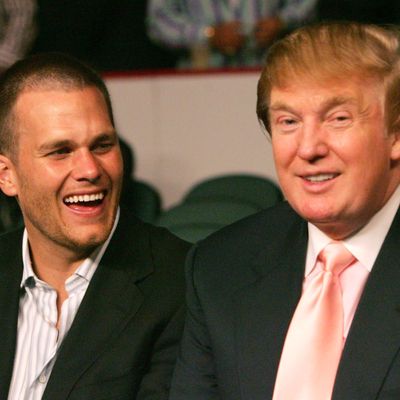
On Sunday morning, a minor transaction flitted across the Major League Baseball wires, unnoticed by anyone but the most dedicated fantasy-baseball wonks. The Tampa Bay Rays, currently in first place in the American League East, had released veteran left-handed reliever Sean Gilmartin, a journeyman who played parts of six seasons with the Mets, Orioles, and Rays. (He actually made a brief two-batter appearance in the 2016 World Series for the Mets.) Gilmartin is a baseball D-lister, the sort of just-hanging-around player who is typically signed for a few games, then sent back down to the minors (back when minor leagues were playing). And he’s at an age, 30, when most middling players might start thinking it’s time to focus their lives on something other than baseball. Players like Gilmartin are cut all the time, and it’s no big deal. But when I saw this news, I braced for impact.
Why? Because Gilmartin isn’t just a soft-tossing left-hander. He’s also the husband of White House press secretary Kayleigh McEnany. The two were the focus of a soft feature in the Tampa Bay Times back in March, in which Gilmartin said he studiously avoided talking politics in the baseball clubhouse, though, “[Kayleigh and I] align fairly evenly on stuff like that.” And now he’s unemployed. Considering the Rays’ Twitter account greeted Opening Day by saying, “Today is Opening Day, which means it’s a great day to arrest the killers of Breonna Taylor,” I was half expecting Gilmartin’s release to be marked with a Trump tweet claiming it as an act of political vengeance by the team. I suppose the president might still get around to it.
The episode — or lack of one — got me thinking that the once-symbiotic relationship between Trump and conservative athletes isn’t what it used to be. And as the Republican National Convention gets underway with its parade of Trumps and Scott Baio–level celebrities, there is an undeniable paucity of athletes and sports figures there to support the president. As in 2016, UFC president Dana White will be in attendance —he’s as steadfast a Trump loyalist as you will find— and old Trump pal Herschel Walker delivered a “he’s not racist!” paean to the president on Monday night. But otherwise, the slate is entirely barren of anyone involved in sports at all. This is unusual for the RNC itself, which once nominated a Bills quarterback for vice-president, but particularly so for Trump, who, as a golf-resort operator, former football-team owner, boxing promoter, and member of the WWE Hall of Fame, has as much of a connection to professional sports as any president in United States history.
Trump is constantly using sports to advance his interests, whether it’s tweeting in support of college athletes who “want to play,” complaining that he’s “tired of watch 14-year-old baseball games,” finding friendly college football crowds in the South or, most famously, turning Colin Kaepernick and kneeling athletes into enemies of the state. He only seems to be enjoying the job of president when he’s hosting championship teams at the White House, even when he’s only offering them fast food. It’s no wonder he’s always so aggrieved when they don’t want to come.
It was easy and comfortable for athletes and coaches to endorse Trump in 2016, and there were many who did so: bold-faced names from Bobby Knight to Terrell Owens to Caitlyn Jenner to George Brett to, famously, Patriots coach Bill Belichick, who wrote Trump an endorsement letter that Trump read aloud to a rally audience just days before the election.
But in 2020, the sports figures left publicly supporting the president are mostly the kind of freak-show acolytes you see among Trump supporters in the celebrity world — the St. Louis khaki-sporting lawn gunmen of sports. (On the other side of the aisle, meanwhile, Stephen Curry and his family were the last people to speak at the DNC before Joe Biden’s big speech.)
Trump’s sports supporters tend to be characters with shady histories like his own, people like Curt Schilling, Tito Ortiz, Mike Ditka, Dennis Rodman (though he is wavering), and golfer John Daly, who’s such a Trump supporter he actually recorded a video at a Trump club in April, for the Trump Organization’s official YouTube channel, that includes an, uh, inventive therapy for dealing with COVID-19.
This is not to say there aren’t high-profile sports figures still on the Trump train. Miami Dolphins owner Stephen Ross hosted a fundraiser for the president last month that brought in $12 million, and he is hardly alone among NFL owners, including Patriots owner Robert Kraft (who has a long history with Trump) and Cowboys owner Jerry Jones, both of whom are more famous than most of their players. But no one is doing so publicly. Tom Brady is widely considered Trump’s most high-profile athlete supporter, but he distanced himself from the president years ago — he didn’t attend either of the Patriots’ last two trips to the White House — and the pair’s “friendship” has always felt more celebrity-transactional than particularly political. (Though they certainly share an affinity for quack science.)
And a lot of the sports figures who came out for Trump in 2016 have been awfully quiet. Former Jets coach and current ESPN analyst Rex Ryan, who introduced Trump at a rally in Buffalo when he was coach of the Bills four years ago, has said he regrets supporting him, though few have been so open about any buyer’s remorse. Many athletes who cheered the night of Trump’s election — like former NFL star Shawne Merriman, star pitcher Jake Arrietta, and baseball iconoclast Trevor Bauer — have been curiously silent about the election this year, as have all those NFL owners who were supposedly so worried about Trump two years ago. It is unlikely a lot of these people have stopped supporting Trump; a few retired NFL players like Brett Favre and Jay Feely have been photographed golfing with him, and it’s worth remembering that two days before Trump’s sniffling, end-of-days coronavirus address to the nation on March 11 — the same day that the NBA shut down and Tom Hanks tested positive for COVID-19 — Trump hit the links with several players on the defending-champion Washington Nationals baseball team.
Voting for Trump and actively advocating for him are two very different things, though. Much has been made of the NBA and WNBA’s activism from their bubble in Orlando, but the NHL knelt for Black Lives Matter in its opening games and Major League Baseball began its season with #BLM painted behind the pitcher’s mound. And of course Bubba Wallace is the best thing NASCAR has going right now. Leagues are, more than anything else, corporations, and the energy in corporations right now is with BLM and inclusion, not with Trump. Some star athletes and sports figures might secretly agree with the president, but they’re not going to take the risk of broadcasting it. Even poor Sean Gilmartin, who is literally married to Trump’s press secretary, doesn’t want to bring up Trump around his teammates.
There is a natural aversion to getting too political in locker rooms, which usually include players of all different backgrounds and demographics. But times have changed, and speaking out on politics — or anything off the court or field — isn’t just de rigueur in 2020, it’s almost expected. Athletes hiding their political intentions feels very 1986, and definitely out of step with the current moment. And if you think this dynamic is noticeable now, wait until the first NFL season since the George Floyd protests began. If the stakes were as apocalyptic as Trump and his supporters are sure to make it sound at the RNC, now would seem like the time for the Trump fans to speak up. But given that there’s been nary a peep beyond the Dana Whites and John Dalys of the world, that seems unlikely.
This reticence might come down to the most important attribute every athlete shares: the love of winning. There might be athletes and sports figures who are still drawn to Trump, but what they are drawn to even more is “not losing.” If Trump were strong right now, you’d hear more athletes piping up, and maybe even showing up at the RNC. But you’re not. And that’s because Trump is widely perceived as the one thing most anathema to people in sports: a loser. Sports figures want to be heard. But more than anything, always: They want to be on the winning team.






























